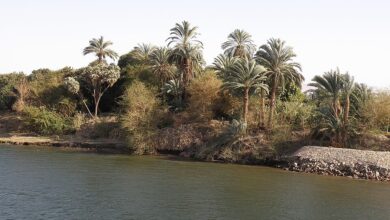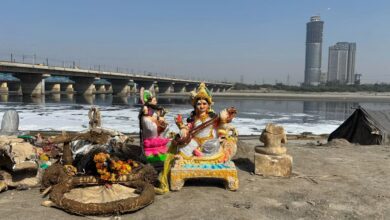"Fresh water, rare water" was the name of a conference held yesterday at the Bibliotheca Alexandrina under the auspices of the UNDP and Weghat Nazar magazine. A large number of environment specialists attended the event, which tackled potential threats to the environment of the Arab region, such as desertification, rising sea levels and inundation.
Conference participants pointed to studies conducted by the Intergovernmental Panel on Climate Change and a 2009 report by the Arab Forum for Environment and Development. The authors of these studies claimed that Arab states stood to be most affected by climate change, rising sea levels and falling precipitation, especially given that the region already suffered from chronic droughts and water scarcity.
Attendees also discussed water scarcity in the region, warning that this would reach crisis levels by the year 2050. They presented as evidence a recent report published in Japan that found that the Fertile Crescent region–comprising Palestine, Iraq, Lebanon, Syria and Jordan–would be negatively impacted by the end of this century by diminishing water supplies. The problem, the report concluded, had been exacerbated by certain human practices such as large-scale dam building and unsustainable irrigation techniques, both of which squander a full half of the region’s water resources.
Panel speakers also described rising sea levels as a threat to Arab coastlines, where the majority of the region’s economic and agricultural activities are concentrated. A one-meter increase in sea levels, they noted, would have a direct impact on some 41,500 square kilometers of regional coastline, with the most affected areas being in Egypt, Tunisia, Algeria, Kuwait, Bahrain and the United Arab Emirates.
Egypt will see the strongest impact on its farmlands–an estimated 12 percent of which will be inundated–while up to six million people could be displaced, conference participants warned.
Bibliotheca Director Ismael Serag Eddin declared that, in the mid 1990s, he had cautioned against neglecting regional water issues. He called for changing certain irrigation and farming practices, especially in light of the fact that 80 percent of water consumption in the Arab world is accounted for by farming.
Serag Eddin also stressed that the Arab’s primary enemy vis-a-vis the water issue was not Israel–despite the Jewish state’s maneuvering in the Nile basin–but rather changes in the climate. Water demand in Egypt, he said, was even outstripping population growth.
Some attendees took issue with Serag Eddin’s assertion that Ethiopia was unable to threaten Egypt’s access to Nile water via dams it is building upstream. The rocky nature of Ethiopian land, Serag Eddin said, did not allow for the construction of dams.
Citics, however, pointed out that Ethiopia was currently digging tunnels to construct dams.
Translated from the Arabic Edition.




